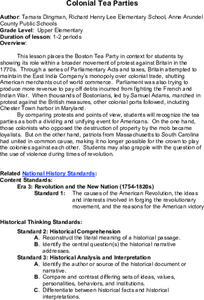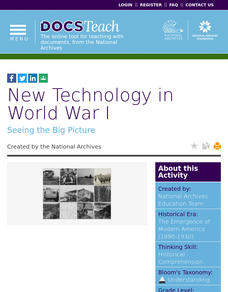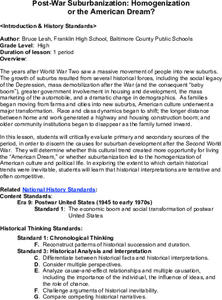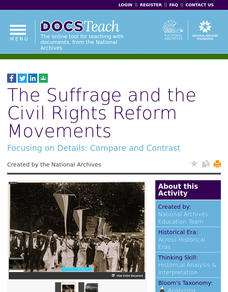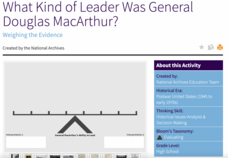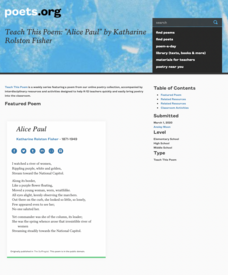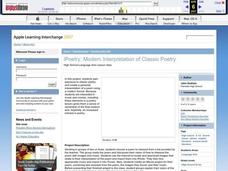Center for History Education
Colonial Tea Parties
Most people know of the Boston Tea Party, but it was only one of similar protests throughout the colonies. Using a case study from Maryland, learners explore primary sources, including images and newspaper accounts of similar tea...
Center for History Education
Who Burned the Peggy Stewart?
Not all Patriots were on the same page against the British before the Revolutionary War. While some wanted to use peaceful means, such as debate and petition, others used violence, such as burning ships carrying British tea. Using...
Center for History Education
Was the Stamp Act Fair?
Pledge your loyalty to the king and the Stamp Act or sign an oath against the tax. After simulating an in-class tax for school supplies, young historians consider the reasons for the Stamp Act and similar colonial policies. The...
DocsTeach
New Technology in World War I
A fast-paced activity focuses on the development of technology during World War I. Young historians match images of new technologies and complete a worksheet. Scholars also read an account of the war from the perspective of an American...
Center for History Education
Post-War Suburbanization: Homogenization
The results of World War II made waves all the way to suburban life today. Examine the flight from the cities using images and documents from the 1950s building boom, including a quote analysis and political cartoons. The resource...
Center for History Education
Dust Bowl Story
Images of the Dust Bowl during the Great Depression are haunting in the suffering they show. Young historians use photographs—both iconic and lesser known—to tell about the human experience during this time. A series of photographs, as...
DocsTeach
Cultural Diplomacy and the Smith-Mundt Act
During the Cold War, the United States used everything from bookmobiles to radio stations to improve its image globally. Using documents from the programs, including photographs and official memos, individuals consider how the United...
DocsTeach
The Suffrage and the Civil Rights Reform Movements
It's the American way to put one foot in front of the other and march. Using images of protests from the civil rights and women's suffrage movements, young historians analyze similarities between the two watershed moments of social...
DocsTeach
What Kind of Leader Was General Douglas MacArthur?
For five decades, General Douglas MacArthur shaped US military involvement around the world. His career ended when he went toe to toe with President Dwight Eisenhower over the Korean War. Young historians evaluate the complicated command...
DocsTeach
Around the World with Ernest Hemingway
Ernest Hemingway was a traveler and added evidence of these travels to his works. An engaging activity asks readers to analyze 20 photographs of the author, then drag the images to the correct location on an interactive map.
PBS
Pearl Harbor and the Internment of Japanese Americans during World War II
Balancing national security and civil liberties can be tricky. To appreciate the tension between these two concepts, class members investigate the Japanese attack on the U.S. Naval Base at Pearl Harbor and President Franklin D....
K20 LEARN
The Tulsa Race Massacre
The 1921 Tulsa Race Massacre is the focus of a lesson that explores the causes and consequences of the destruction of the Greenwood section of Tulsa, Oklahoma. Pupils examine primary source images, a video clip covering the riots, and...
Smithsonian Institution
The Suffragist: Educator's Guide for Classroom Video
Class members take on the role of historical investigators to determine why it took 40 years for women in the United States to get the right to vote. Sleuths view videos and analyze primary sources and images to gather evidence to answer...
Academy of American Poets
Teach This Poem: "Alice Paul" by Katharine Rolston Fisher
Powerful women need not look like Wonder Woman. After writing a paragraph about a strong woman they know, young scholars examine images of Alice Paul and then do a close reading of Katharine Rolston Fisher's poem "Alice Paul." Finally,...
K20 LEARN
Power to the People
Black berets, black leather jackets, raised black fists, chants of "Power to the People!" These are the images that many associate with the Black Panther Party. Often forgotten are the programs the party created during the Civil Rights...
DocsTeach
African American Soldiers and Civil Rights During WWI
Young scholars analyze primary source documents and images to determine how African American soldiers were denied their civil rights during World War I.
Curated OER
iPoetry: Modern Interpretation of Classic Poetry
Young scholars interpret a piece of poetry with images and music in a movie project.
Curated OER
Detecting Breast Cancer
Students develop a painless means for identifying cancerous tumors. For this imaging lesson students list the information that may be needed to answer the problem.
Curated OER
DO YOU HEAR WHAT I SEE?
Students work with a partner to describe an image, and the other, without seeing the image, attempts to draw it. They sit back to back. Students are explained that until the exercise is complete, they must remain with their backs to each...
Curated OER
Worth a Thousand Words: Depression-Era Photographs
Young scholars view images of New Deal programs to see its successes. They work in groups to create captions for the images and suggest captions that might indicate different meanings.
Curated OER
Telling Stories: Symbols of a Life
Art and literature can go hand in hand, they both are used to express elements of the self in a creative and interesting way. Budding story tellers interpret and analyze the narrative elements they find in a work of art. They focus on...
Curated OER
Transformations
Several practice exercises suitable for any geometry class working on transformation, symmetry, and tessellation -- especially visual representations of image translation, rotation, and reflection, symmetry, tessellations and tangrams --...
Curated OER
I've Just Seen a Face: Portraits
Students examine portraits for different images they project, cite three purposes a portrait can serve, analyze portraits of historical figures, and relate biographical research to portraits.
Curated OER
Can You See What I See?
Young scholars gain an understanding of the methods used to explore the earth's surface. Students create a time line leading to the first satellite image of the Earth that includes the various methods utilized to observe the earth's...
Other popular searches
- Imagery
- Body Image
- Mental Images
- Imagery Figurative Language
- Visual Imagery
- Music and Mental Images
- Microscopic Images
- Self Image
- Guided Imagery
- Analyzing Photographs
- Imagery and Poetic Devices
- Imagery Words
